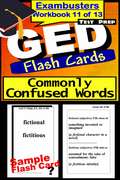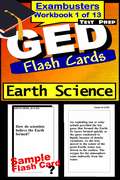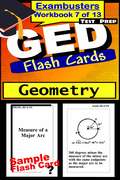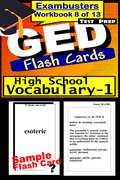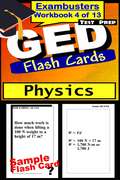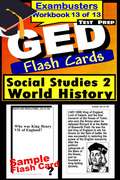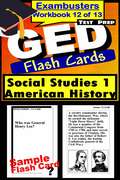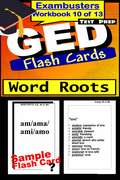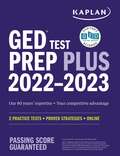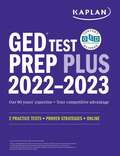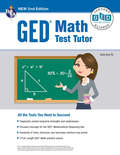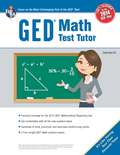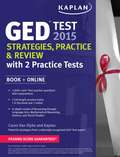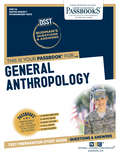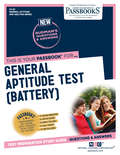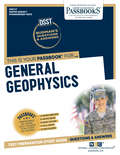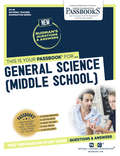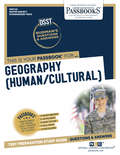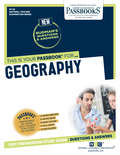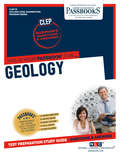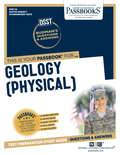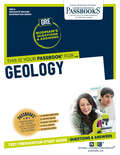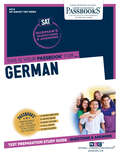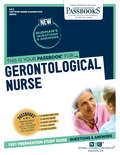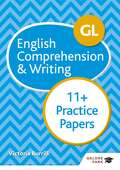- Table View
- List View
GED Test Prep Flash Cards: Commonly Confused Words (Exambusters GED Workbook #11 of 13)
by Ace Inc.<P><P><i>Advisory: Bookshare has learned that this book offers only partial accessibility. We have kept it in the collection because it is useful for some of our members. Benetech is actively working on projects to improve accessibility issues such as these.</i><P><P> Do you know the difference between "fewer" and "less," when to use "it's" or "its," or how to distinguish between "historical" and "historic" or "tortuous" and "torturous?" <P><P>500 pairs of commonly confused words, some so frequently misused that their wrong application has become acceptable to many ears. Includes part of speech, pronunciation, simple definition, and usage example. <P>EXAMBUSTERS GED Prep Workbooks provide comprehensive, fundamental GED review--one fact at a time--to prepare students to take practice GED tests. Each GED study guide focuses on one specific subject area covered on the GED exam. From 300 to 600 questions and answers, each volume in the GED series is a quick and easy, focused read. Reviewing GED flash cards is the first step toward more confident GED preparation and ultimately, higher GED exam scores!
GED Test Prep Flash Cards: Earth Science (Exambusters GED Workbook #1 of 13)
by Ace Inc.<P><P><i>Advisory: Bookshare has learned that this book offers only partial accessibility. We have kept it in the collection because it is useful for some of our members. Benetech is actively working on projects to improve accessibility issues such as these.</i><P><P> 600 questions. Topics: Earth's Origin, Minerals, Rocks, Weathering, Wind and Glaciers, Oceans, Maps, Atmosphere, Astronomy <P><P> EXAMBUSTERS GED Prep Workbooks provide comprehensive, fundamental GED review--one fact at a time--to prepare students to take practice GED tests. Each GED study guide focuses on one specific subject area covered on the GED exam. From 300 to 600 questions and answers, each volume in the GED series is a quick and easy, focused read. Reviewing GED flash cards is the first step toward more confident GED preparation and ultimately, higher GED exam scores!
GED Test Prep Flash Cards: Geometry (Exambusters GED Workbook #7 of 13)
by Ace Inc.<P><P><i>Advisory: Bookshare has learned that this book offers only partial accessibility. We have kept it in the collection because it is useful for some of our members. Benetech is actively working on projects to improve accessibility issues such as these.</i><P><P> 450 questions. Topics: Triangles, Proofs, Perpendicular Lines, Parallel Lines, Quadrilaterals, Circles, Coordinate Geometry, and more. <P><P> EXAMBUSTERS GED Prep Workbooks provide comprehensive, fundamental GED review--one fact at a time--to prepare students to take practice GED tests. Each GED study guide focuses on one specific subject area covered on the GED exam. From 300 to 600 questions and answers, each volume in the GED series is a quick and easy, focused read. Reviewing GED flash cards is the first step toward more confident GED preparation and ultimately, higher GED exam scores!
GED Test Prep Flash Cards: High School Vocabulary 1 (Exambusters GED Workbook #8 of 13)
by Ace Inc.<P><P><i>Advisory: Bookshare has learned that this book offers only partial accessibility. We have kept it in the collection because it is useful for some of our members. Benetech is actively working on projects to improve accessibility issues such as these.</i><P><P> 500 words every high school student should know. Includes sample sentence, part of speech, pronunciation, succinct, easy-to-remember definition, and common synonyms and antonyms. <P><P> EXAMBUSTERS GED Prep Workbooks provide comprehensive, fundamental GED review--one fact at a time--to prepare students to take practice GED tests. Each GED study guide focuses on one specific subject area covered on the GED exam. From 300 to 600 questions and answers, each volume in the GED series is a quick and easy, focused read. Reviewing GED flash cards is the first step toward more confident GED preparation and ultimately, higher GED exam scores!
GED Test Prep Flash Cards: Physics (Exambusters GED Workbook #4 of 13)
by Ace Inc.<P><P><i>Advisory: Bookshare has learned that this book offers only partial accessibility. We have kept it in the collection because it is useful for some of our members. Benetech is actively working on projects to improve accessibility issues such as these.</i><P><P> 600 questions. Sample problems. Topics: Metric System, Motion and Forces, Work and Energy, Fluids, Sound, Light and Optics, Static Electricity, D.C. and A.C. Circuits, Magnetism <P><P> "EXAMBUSTERS GED Prep Workbooks" provide comprehensive, fundamental GED review--one fact at a time--to prepare students to take practice GED tests. Each GED study guide focuses on one specific subject area covered on the GED exam. From 300 to 600 questions and answers, each volume in the GED series is a quick and easy, focused read. Reviewing GED flash cards is the first step toward more confident GED preparation and ultimately, higher GED exam scores!
GED Test Prep Flash Cards: Social Studies 2 - World History (Exambusters GED Workbook #13 of 13)
by Ace Inc.<P><P><i>Advisory: Bookshare has learned that this book offers only partial accessibility. We have kept it in the collection because it is useful for some of our members. Benetech is actively working on projects to improve accessibility issues such as these.</i><P><P> 600 questions. Topics: Beginning of Civilization, Middle Ages, Nationalism, Imperialism, The Cold War, and more. <P><P>EXAMBUSTERS GED Prep Workbooks provide comprehensive, fundamental GED review--one fact at a time--to prepare students to take practice GED tests. Each GED study guide focuses on one specific subject area covered on the GED exam. From 300 to 600 questions and answers, each volume in the GED series is a quick and easy, focused read. Reviewing GED flash cards is the first step toward more confident GED preparation and ultimately, higher GED exam scores!
GED Test Prep Flash Cards: Social Studies I - American History (Exambusters GED Workbook #12 of 13)
by Ace Inc.<P><P><i>Advisory: Bookshare has learned that this book offers only partial accessibility. We have kept it in the collection because it is useful for some of our members. Benetech is actively working on projects to improve accessibility issues such as these.</i><P><P> 600 questions (ILLUSTRATED). Topics: Colonial Era, Revolutionary Era, Age of Expansion, Civil War, Reconstruction, The 1920s, The Depression, and more. <P><P>EXAMBUSTERS GED Prep Workbooks provide comprehensive, fundamental GED review--one fact at a time--to prepare students to take practice GED tests. Each GED study guide focuses on one specific subject area covered on the GED exam. From 300 to 600 questions and answers, each volume in the GED series is a quick and easy, focused read. Reviewing GED flash cards is the first step toward more confident GED preparation and ultimately, higher GED exam scores!
GED Test Prep Flash Cards: Word Roots (Exambusters GED Workbook #10 of 13)
by Ace Inc.<P><P><i>Advisory: Bookshare has learned that this book offers only partial accessibility. We have kept it in the collection because it is useful for some of our members. Benetech is actively working on projects to improve accessibility issues such as these.</i><P><P> A unique collection of 380 essential Word Roots, Prefixes, and Suffixes, each with up to ten derivative word examples and definitions. Interpret new words without a dictionary. You'll view language from an entirely new perspective. <P><P>EXAMBUSTERS GED Prep Workbooks provide comprehensive, fundamental GED review--one fact at a time--to prepare students to take practice GED tests. Each GED study guide focuses on one specific subject area covered on the GED exam. From 300 to 600 questions and answers, each volume in the GED series is a quick and easy, focused read. Reviewing GED flash cards is the first step toward more confident GED preparation and ultimately, higher GED exam scores!
GED Test Prep Plus 2022-2023: 2 Practice Tests + Proven Strategies + Online (Kaplan Test Prep)
by Caren Van SlykeWith realistic practice, proven strategies, and expert guidance, Kaplan's GED Test Prep Plus 2022–2023 gives you everything you need to pass the test - including 60 hours of online video instruction. Kaplan is the official partner for live online prep for the GED test, and our content is 100% aligned with the GED test objectives.Kaplan&’s GED Prep Plus 2022-2023 is designed for self-study so you can prep at your own pace, on your own schedule. We&’re so confident that GED Test Prep Plus 2022–2023 offers the guidance you need that we guarantee it: After studying with our book, you'll pass the GED—or you'll get your money back.The Best PracticeMore than 1,000 practice questionsTwo full-length practice tests: one in the book and one online with feedback60 online videos with expert instruction, explanations, and strategiesA diagnostic pretest to help you set up a personalized study planEssential skills and review for all GED subjects: Reasoning through Language Arts, Mathematical Reasoning, Science, and Social StudiesEffective strategies for writing the RLA extended responseClear instructions on using the Texas Instruments TI-30XS MultiView calculatorExpert GuidanceOur books and practice questions are written by teachers who know students—every explanation is written to help you learn.We know the test: The Kaplan team has put tens of thousands of hours into studying the GED—we use real data to design the most effective strategies and study plans.We invented test prep—Kaplan (www.kaptest.com) has been helping students for 80 years, and our proven strategies have helped legions of students achieve their dreams.
GED Test Prep Plus 2022-2023: Includes 2 Full Length Practice Tests, 1000+ Practice Questions, and 60 Online Videos (Kaplan Test Prep)
by Caren Van SlykeRated "Best of the Best" in GED Prep Books by BestReviewsWith realistic practice, proven strategies, and expert guidance, Kaplan's GED Test Prep Plus 2022–2023 (English edition, US exam) gives you everything you need to pass the test - including 60 online videos to provide expert guidance. Kaplan is the official partner for live online prep for the GED test, and our GED study guide is 100% aligned with the GED test objectives. Kaplan&’s GED Prep Plus 2022-2023 covers all subjects and is designed for self-study so you can prep at your own pace, on your own schedule. We&’re so confident that GED Test Prep Plus 2022–2023 offers the guidance you need that we guarantee it: After studying with our book, you'll pass the GED—or you'll get your money back.The Best Practice More than 1,000 practice questions Two full-length practice tests: one in the book and one online with feedback 60 online videos with expert instruction, explanations, and strategies A diagnostic pretest to help you set up a personalized study plan Essential skills, lesson plans, reviews for all GED subjects: Reasoning through Language Arts, Mathematical Reasoning, Science, and Social Studies Effective strategies for writing the RLA extended response Clear instructions on using the Texas Instruments TI-30XS MultiView calculator Expert Guidance Our GED prep books and practice questions are written by teachers who know students—every explanation is written to help you learn. We know the test: The Kaplan team has put tens of thousands of hours into studying the GED—we use real data to design the most effective strategies and study plans. We invented test prep—Kaplan (www.kaptest.com) has been helping students for 80 years, and our proven strategies have helped legions of students achieve their dreams with our best-selling test prep books.
GED® Math Test Tutor, 2nd Edition
by Sandra RushREA's GED® Math Test Tutor - Focus on the most challenging part of the GED® test! <P><P>Revised Second Edition <P><P>It's like having your own tutor… <P><P>Each year, test-takers report that the Mathematical Reasoning test is the toughest of all the GED® tests. <P><P>That's why REA offers the most complete guide to success on the GED® Math test. Written by Sandra Rush, a GED® Math tutor and test expert <P><P>- This revised second edition of our best-selling test prep is completely aligned with the content and format of the current GED® test. A comprehensive review covers all the mathematics topics tested on the exam, including fractions, decimals, percentages, algebra, polynomials, scientific notation, and more. Know your way around the TI-30XS MultiView™ calculator <P><P>- A step-by-step tutorial gets you up and running in no time. Helpful hints you need to know - Hundreds of hints, shortcuts, and exercises reinforce key math points, including secrets of rounding, calculating with fractions, knowing the difference between domain and range, a neat way to remember negative and absolute values, and much more!Diagnostic pretest and two full length practice tests <P><P>- A diagnostic pretest with comprehensive feedback helps you pinpoint your strengths and weaknesses. Two full-length practice tests feature every type of question (including drag-and-drop, hot-spot, and drop-down test items), subject area, and skill tested on the GED® Mathematical Reasoning test. Each practice test comes with detailed answer explanations to help you identify where you need extra review.If you're concerned about your math score on the GED®, you need REA's GED® Math Test Tutor!
GED® Math Test Tutor, For the New 2014 GED® Test: All The Tools You Need To Succeed (GED® & TABE Test Preparation)
by Sandra RushREA's GED® Math Test Tutor - Helps You Pass the Most Challenging Part of the GED® <P><LP>Get ready for the math portion of the GED® with REA's GED® <P><P>Math Test Tutor Book features: <br>- Content 100% aligned with the new 2014 GED® test <br>- Written by a GED® math tutor and test expert - Comprehensive review covers every topic on the exam - Includes step-by-step instructions on how to use the TI-30XS MultiViewTM calculator <br>- 2 full-length practice tests (featuring new question types) with detailed answers It's like having your own tutor... <P><P>Every year, test-takers report that the math test is the toughest of all the GED® tests. That's why REA offers the most complete guide to success on the new GED® Math test. <P><P> Let our expert math tutor help you get one step closer to your GED® diploma! GED® test tutor Sandra Rush gives you all the tools you need to succeed: <br>- Refresh your knowledge on all things math <br>- from polynomials and powers to statistics and equations, fractions, decimals, and scientific notation <br>- Know your way around the TI-30XS MultiViewTM calculator <br>- a step-by-step tutorial gets you up and running in no time <br>- Helpful hints you need to know - hundreds of hints, shortcuts, and exercises reinforce key math points, including secrets of rounding, calculating with fractions, quickly knowing the difference between domain and range, a neat way to remember negative and absolute values, and much more <br>- 2 full-length practice tests - mimic the real GED® Math test. <P><P>Preview all the new question types (including hot-spot, fill-in-the-blank, drag-and-drop, and more). Detailed answer explanations help you build your knowledge and identify where you need more review and practice. If you're concerned about your math score on the GED®, you need REA's GED® Math Test Tutor!
GED® Test 2015 Strategies, Practice, and Review
by KaplanWhile other GED guides are designed for classroom use, Kaplan's GED Test 2015 Strategies, Practice, and Review is a self-study program for the GED. <P><P> Kaplan's GED Test 2015 Strategies, Practice, and Review self-study system includes: 1,000+ practice questions with detailed explanations 2 Full-length practice tests--1 in the book and 1 online practice test In-book diagnostic pretest to help you set up a personalized study plan.
GENERAL ANTHROPOLOGY: Passbooks Study Guide (DANTES Subject Standardized Tests (DSST) #Vol. Dantes-16)
by National Learning CorporationThe DSST Subject Standardized Tests are comprehensive college and graduate level examinations given by the Armed Forces, colleges and graduate schools. These exams enable students to earn college credit for what they have learned through self-study, on the job, or by other non-traditional means. The DSST General Anthropology Passbook® prepares candidates for the DSST exam, which enables schools to award credit for knowledge acquired outside the normal classroom environment. It provides a series of informational texts as well as hundreds of questions and answers in the areas that will likely be covered on your upcoming exam, including but not limited to: genetics; fossils; archaeology and civilization; language; religion; and more.
GENERAL APTITUDE TEST: Passbooks Study Guide (General Aptitude and Abilities Series (CS) #Vol. 59)
by National Learning CorporationThe General Aptitude and Abilities Series provides functional, intensive test practice and drill in the basic skills and areas common to many civil service, general aptitude or achievement examinations necessary for entrance into schools or occupations. The General Aptitude Test (Battery) Passbook® prepares you by sharpening the skills and abilities necessary to succeed in different types of civil-service positions. It provides hundreds of multiple-choice questions that include, but are not limited to: spelling; vocabulary and word meaning; reading comprehension; basic mathematics; graphs, charts and tables; and more.
GENERAL GEOPHYSICS: Passbooks Study Guide (DANTES Subject Standardized Tests (DSST))
by National Learning CorporationThe DSST Subject Standardized Tests are comprehensive college and graduate level examinations given by the Armed Forces, colleges and graduate schools. These exams enable students to earn college credit for what they have learned through self-study, on the job, or by other non-traditional means. The DSST General Geophysics Passbook® prepares candidates for the DSST exam, which enables schools to award credit for knowledge acquired outside the normal classroom environment. It provides a series of informational texts as well as hundreds of questions and answers in the areas that will likely be covered on your upcoming exam.
GENERAL SCIENCE: Passbooks Study Guide (National Teacher Examination Series (NTE) #Ats-9d)
by National Learning CorporationThe National Teacher/PRAXIS Examinations are designed to provide objective measurement of the knowledge, skills and abilities required of teachers. The Passbook® for the General Science exam provides hundreds of multiple-choice questions in the areas that will likely be covered on your upcoming certification test.
GEOGRAPHY: Passbooks Study Guide (DANTES Subject Standardized Tests (DSST) #No. Dantes-62)
by National Learning CorporationThe DSST Subject Standardized Tests are comprehensive college and graduate level examinations given by the Armed Forces, colleges and graduate schools. These exams enable students to earn college credit for what they have learned through self-study, on the job, or by other non-traditional means. The DSST Geography (Human/Cultural) Passbook® prepares candidates for the DSST exam, which enables schools to award credit for knowledge acquired outside the normal classroom environment. It provides hundreds of questions and answers in the areas that will likely be covered on your upcoming exam, including but not limited to: physical geography and the environment; cultural systems; natural resources; regional geography; and more.
GEOGRAPHY: Passbooks Study Guide (National Teacher Examination Series (NTE) #No. Dantes-62)
by National Learning CorporationThe National Teacher/PRAXIS Examinations are designed to provide objective measurement of the knowledge, skills and abilities required of teachers. The Passbook® for the Geography exam provides hundreds of multiple-choice questions in the areas that will likely be covered on your upcoming certification test.
GEOLOGY: Passbooks Study Guide (College Level Examination Program Series (CLEP) #Vol. Clep-15)
by National Learning CorporationThe College Level Examination Program (CLEP) enables students to demonstrate college-level achievement and earn college credit in various subject areas based on knowledge acquired through self-study, high school and adult courses, or through professional means. The CLEP Geology Passbook® prepares you by sharpening knowledge of the skills and concepts necessary to succeed on the upcoming exam and the college courses that follow. It provides a series of informational texts as well as hundreds of questions and answers in the areas that will likely be covered on your upcoming exam.
GEOLOGY: Passbooks Study Guide (DANTES Subject Standardized Tests (DSST) #Pep-56)
by National Learning CorporationThe DSST Subject Standardized Tests are comprehensive college and graduate level examinations given by the Armed Forces, colleges and graduate schools. These exams enable students to earn college credit for what they have learned through self-study, on the job, or by other non-traditional means. The DSST Geology (Physical) Passbook® prepares candidates for the DSST exam, which enables schools to award credit for knowledge acquired outside the normal classroom environment. It provides a series of informational texts as well as hundreds of questions and answers in the areas that will likely be covered on your upcoming exam, including but not limited to: rocks and minerals; glaciers, oceans and deserts; plate tectonics; and more.
GEOLOGY: Passbooks Study Guide (Graduate Record Examination Series (GRE) #Vol. Clep-15)
by National Learning CorporationThe Graduate Record Examinations, developed by Education Testing Service, are required for admission to graduate school. The GRE Geology Passbook® prepares you by sharpening the skills and abilities necessary to succeed on your upcoming exam, providing hundreds of questions and answers in the areas that will likely be covered on your test.
GERMAN: Passbooks Study Guide (College Board SAT Subject Test Series #Clep-45)
by National Learning CorporationSAT Subject Tests, developed by the College Board, are required by many colleges and universities as part of their admission requirements. The SAT German Passbook® prepares you for your test by allowing you to take practice exams modeled after the real SAT Subject Test. It provides hundreds of questions and answers that require knowledge of the German language, including grammar, parts of speech and appropriate context. These questions are similar to the ones you will find on your upcoming exam, including but not limited to: sentence completion; reading comprehension (short and long passages); vocabulary; and idioms.
GERONTOLOGICAL NURSE: Passbooks Study Guide (Certified Nurse Examination Series)
by National Learning CorporationThe Certified Nurse Examination Series prepares individuals for licensing and certification conducted by the American Nurses Credentialing Center (ANCC), the National Certification Corporation (NCC), the National League for Nursing (NLN), and other organizations. The Gerontological Nurse Passbook® provides a series of informational texts as well as hundreds of questions and answers in the areas that will likely be covered on your upcoming exam.
GL 11+ English Comprehension & Writing Practice Papers
by Victoria BurrillFour practice exam papers to test pupils ahead of the GL 11+ English test, including the bespoke tests created by GL for individual schools. They cover comprehension, spelling, punctuation and grammar, as well as writing. The papers are designed to:- Develop and perfect exam technique for GL English 11+ exams- Give practice in answering comprehension, spelling, grammar and writing questions- Identify weaker areas and improve results by studying the answers, which contain references to Galore Park's revision materials for guidance and useful tips- The resource also contains links to downloadable answer sheets so that the tests can be re-sat.These practice papers are part of Galore Park's 11+ revision series, which provides a three-step learning journey that teaches children the skills needed to pass rigorous school entrance exams.
